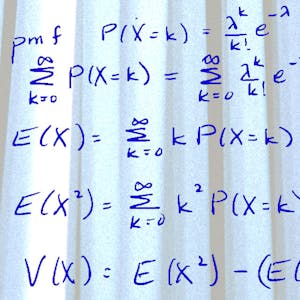Probability Theory Foundation for Data Science
Understand the foundations of probability and its relationship to statistics and data science. We’ll learn what it means to calculate a probability, independent and dependent outcomes, and conditional events. We’ll study discrete and continuous random variables and see how this fits with data collection. We’ll end the course with Gaussian (normal) random variables and the Central Limit Theorem and understand its fundamental importance for all of statistics and data science.This course can be taken for academic credit as part of CU Boulder’s Master of Science in Data Science (MS-DS) degree offered on the Coursera platform. The MS-DS is an interdisciplinary degree that brings together faculty from CU Boulder’s departments of Applied Mathematics, Computer Science, Information Science, and others. With performance-based admissions and no application process, the MS-DS is ideal for individuals with a broad range of undergraduate education and/or professional experience in computer science, information science, mathematics, and statistics. Learn more about the MS-DS program at https://www.coursera.org/degrees/master-of-science-data-science-boulder
.
Logo adapted from photo by Christopher Burns on Unsplash.
Explain why probability is important to statistics and data science.
See the relationship between conditional and independent events in a statistical experiment.
Calculate the expectation and variance of several random variables and develop some intuition.
Syllabus
Syllabus - What you will learn from this course
Week 1
Descriptive Statistics and the Axioms of Probability
Week 2
Conditional Probability
Week 3
Discrete Random Variables
Week 4
Continuous Random Variables
Week 5
Joint Distributions and Covariance
Week 6
Central Limit Theorem
FAQ
When will I have access to the lectures and assignments?
Access to lectures and assignments depends on your type of enrollment. If you take a course in audit mode, you will be able to see most course materials for free. To access graded assignments and to earn a Certificate, you will need to purchase the Certificate experience, during or after your audit. If you don't see the audit option:
What will I get if I subscribe to this Specialization?
When you enroll in the course, you get access to all of the courses in the Specialization, and you earn a certificate when you complete the work. Your electronic Certificate will be added to your Accomplishments page - from there, you can print your Certificate or add it to your LinkedIn profile. If you only want to read and view the course content, you can audit the course for free.
Is financial aid available?
Yes. In select learning programs, you can apply for financial aid or a scholarship if you can’t afford the enrollment fee. If fin aid or scholarship is available for your learning program selection, you’ll find a link to apply on the description page.
Reviews
Need to brush up integral calculus for thios course. Something I haven't looked at for 40 years.
This is a great course on probability. Although I felt like it was too easy and should include more PDFs (such as Beta and Gamma) and random variable transformations.
The instructor is very good, more examples need to be added, there are mistakes in the evaluation
